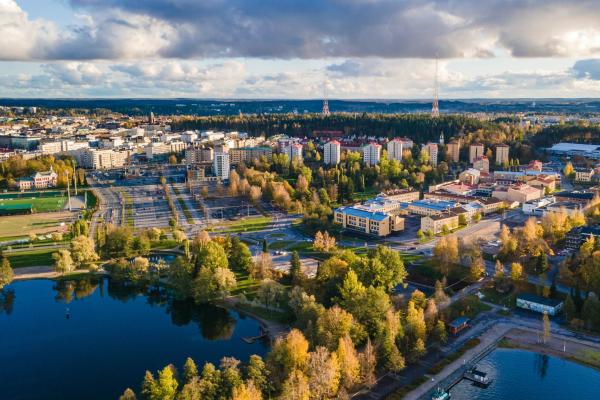The Puhdas Päijät-Häme network was born out of a desire to make a connection with other people who care about the environment.
“In the summer of 2019, I started working on building a community with a few friends. The first event we attended was the autumnal Environment Village, and we started our first litter-picking tour of Lahti’s city centre from there. We were joined at the Environment Village by a university professor for whom we have collected plastic samples for ecotoxicology studies.”
For Riika, a clean environment is a goal that everyone should aspire to. “The earth is our shared home. When waste ends up in nature, it eventually ends up inside us. Collecting litter has strengthened my relationship with nature.”
Picking up cigarette butts, disposable coffee cups and other litter may seem like a frustrating task, but that is not how Riikka-Liisa Aalto sees it.
“The adverse effects of litter are quite diverse. The chemical compounds that dissolve from waste can be very dangerous. For example, the world’s most common piece of litter, the cigarette butt, is extremely harmful.”
In the EU cigarette butts are one of the top ten most common plastic objects found on beaches. Together single-use plastic items represent 50% of marine litter in the EU. To combat this the EU has committed to a new plastics strategy which aims that by 2030 all plastic packaging in the EU market will be reusable or recyclable, the consumption of single-use plastics will be reduced and the use of microplastics will be restricted. This will help cut the industry’s carbon footprint, while reducing plastic waste and marine litter and, slowing the proliferation of microplastics. Within this strategy, the EU is committed to change the way it designs, produces, uses, and disposes of plastics.
“Picking up macro and microplastics from the beach is a form of meditation as much as picking berries in the forest. Since we all benefit from nature, we can also benefit from nature. This creates a strong reciprocal relationship.”
Everyone can join in
At the age of three, Riikka’s child already wants to be involved in collecting litter. Riikka believes in involving children from an early age in picking up litter and in teaching them to do it safely. “Children notice litter much better than adults who have become blind to it. I would very much like to see a national litter education campaign that would reach people through as many media as possible.”
Community Spirit
In less than a year, the Puhdas Päijät-Häme network has organised and promoted seven events; and picked up more than 3,000 litres of litter. It has also cooperated with other organisations that clean up the environment, such as residents’ associations, sports clubs, and the City of Lahti.
Puhdas Päijät-Häme is more than a litter-picking network; the people involved also think about their environmental choices and how to have a clean lifestyle.
“We have become a close-knit community that shares ideas about chemicals and food and other health issues. Many of us want to promote organic food and eating vegetables and locally sourced fish. We also strive to participate in events that promote a clean lifestyle. All you need to join us is an interest in cleaning up your environment”.
Voluntary litter-pickers have known about the problem for years, even in countries where there is no waste management. There is also international cooperation.
“Through shared litter picking challenges, we can help each other and make people aware of the problem in our own countries. We share tips about equipment and even means of transport.”
Discover all the Citizen Diaries from Lahti

Valtteri Bottas began his career when he was just six years old, racing karts in his hometown of Nastola in Finland.

In the winter of 2016, Eetu Floor was walking to a friend’s band practice in Lahti. On his way there, he chose a shortcut through the industrial area of Sopenkorpi where he found an overgrown industrial track and plot.

The Lahti Pelicans is a Finnish professional ice hockey team that plays for the City of Lahti, in the ‘Liiga’, Finland’s top professional ice hockey league.

Emmi Valli-Forsback from Lahti buys almost all of her family’s clothing and household goods second-hand; and rents a market stall to sell on what she no longer needs. She rarely considers buying something new if she can find it second-hand.

Bee doctor Kamran Fakhimzadeh knows what a miracle honey is: to produce a kilo of it, bees have to visit up to ten million flowers. At the same time, bees do us a huge favour by pollinating vegetables and fruit and berry plants.

Rikka-Liisa Aalto has always picked up litter in her local area. After becoming a mother, she started picking up litter almost every day. The Puhdas Päijät-Häme network was born out of a desire to make a connection with other people who care about the environment.

In 2015, in celebration of the 150th anniversary of the Sibelius Hall, the Lahti Symphony Orchestra initiated a project to help the City of Lahti reach its carbon emission reduction goals.

Fashion designer and entrepreneur Riikka Flink has been observing the clothing industry for over 30 years. She believes that ecology, sustainability, and responsibility are possible when production is closely monitored.


